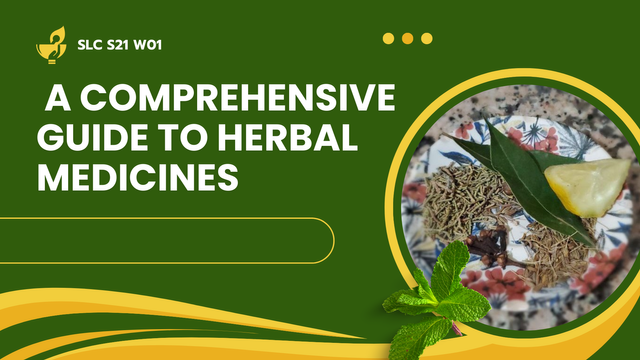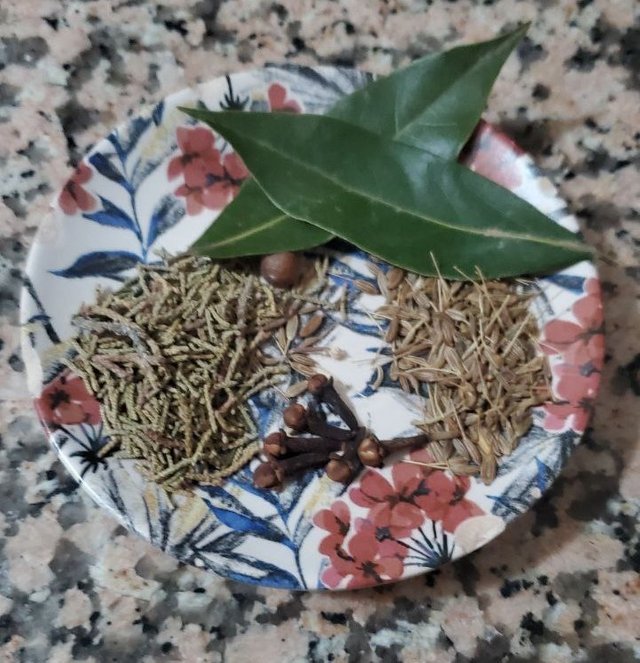SLC S21 Week 1 - A Comprehensive guide to Herbal Medicines

Research Assignment: Research and write a history of herbal medicine in your culture or region.
In Tunisia, herbal medicine dates back to ancient times, where the practices of the indigenous Berbers used herbs such as wormwood and fennel to treat various ailments, a knowledge passed down from generation to generation and enriched over the centuries by the influence of the Carthaginians, the Romans and later by Arab and Islamic medicine which marked a turning point thanks to scholars such as Ibn al-Jazzar, integrating and merging Greco-Roman traditions with new and refined approaches. The Ottoman period continued this evolution by introducing new plants and techniques, thus consolidating the central place of medicinal herbs in traditional health care, while markets and healers continued to perpetuate this knowledge within rural communities.
With the advent of modern medicine, the use of herbal remedies declined somewhat, but recent decades have seen a resurgence of herbal medicine in Tunisia, driven by a renewed interest in natural methods that complement or replace modern medical treatments and by the persistence of traditions passed down by herbalists and healers, who still use local plants for their therapeutic virtues. Today, scientific documentation on the effectiveness of local medicinal plants attests to their cultural importance and their renewed role in health confirming the balance between ancient knowledge and modern methods, and thus preserving a precious intangible heritage for future generations.
Comparison Task: Create a table comparing the benefits and side effects of modern medicines vs. herbal medicines for common ailments (e.g., cold, headache).
This comparison provides an overview of how modern and herbal medicines differ in terms of benefits and potential side effects when treating common ailments.
| Aspect | Modern Medicines | Herbal Medicines |
|---|---|---|
| Common Cold | Benefits: Fast-acting relief, reduces symptoms quickly | Benefits: Natural immune support, soothes the throat, reduces mild symptoms |
| Side Effects: Potential for drowsiness, nausea, dependency | Side Effects: Allergic reactions in some individuals, slower action | |
| Headache | Benefits: Effective pain relief, broad range of options (e.g., NSAIDs, acetaminophen) | Benefits: Fewer chemicals, reduced risk of dependency, holistic treatment |
| Side Effects: Risk of liver damage with overuse, stomach irritation | Side Effects: Mild digestive issues if taken in excess, possible interactions with medications | |
| Cough | Benefits: Quick suppression of symptoms, specialized formulations (expectorants, suppressants) | Benefits: Gentle on the body, naturally soothes and supports respiratory health |
| Side Effects: Drowsiness, dizziness, potential for overuse | Side Effects: Slower response time, taste may be unappealing | |
| Digestive Issues | Benefits: Targeted action for quick relief (e.g., antacids, laxatives) | Benefits: Supports overall digestive health, fewer side effects |
| Side Effects: Risk of dependency, potential side effects like diarrhea or constipation | Side Effects: Mild stomach discomfort in some cases | |
| Insomnia | Benefits: Immediate sleep aid, induces deep sleep | Benefits: Gentle sleep promotion, natural calming effect without severe withdrawal |
| Side Effects: Dependency risk, morning grogginess, tolerance buildup | Side Effects: May take longer to take effect, not suitable for severe cases | |
| Stress/Anxiety | Benefits: Fast relief with prescribed medications (e.g., anxiolytics) | Benefits: Overall calming effect, long-term benefits without strong side effects |
| Side Effects: Risk of addiction, dizziness, drowsiness, withdrawal symptoms | Side Effects: May not be potent enough for severe anxiety, allergic reactions in rare cases |
Herb Identification: Choose 3 herbs from your kitchen like mint, ginger, or turmeric and list their health benefits. Mention the recipes where you have used these herbs.
1. Caraway (Meadow cumin)
Starting with caraway which is an herb rich in antioxidants and also in fiber which makes it an excellent ally to promote digestion and intestinal health by reducing bloating and stomach cramps and thanks to its natural anti-inflammatory properties it helps to soothe the digestive system whilst stimulating the appetite making it particularly beneficial for those looking to improve their digestive comfort in a natural and effective way.
I use caraway in homemade vegetable soup where it adds a spicy and aniseed touch that enhances the overall flavor of the dish and I also integrate it into slow-cooked meat stews to which it brings a subtle aromatic depth and one of my favorite applications is to incorporate caraway seeds into homemade artisan bread which gives the crumb a warm flavor and a unique texture.
2. Rosemary
Rosemary is well known for its powerful antioxidant and anti-inflammatory properties that help improve blood circulation and boost memory and concentration thanks to bioactive compounds like rosmarinic acid and its antimicrobial qualities help to strengthen the immune system while supporting overall health and well-being naturally. I incorporate rosemary into roast chicken dishes where it infuses the meat with its distinct herbal aroma and into roast potatoes which take on a delicious and aromatic flavor thanks to this herb and in addition to main dishes I like to make a rosemary tea by steeping the leaves in hot water to create a soothing drink that stimulates digestion and calms temporary stomach aches.
3. Clove
Clove is a spice with many health benefits thanks to its high eugenol content which has antiseptic analgesic and anti-inflammatory properties making it particularly useful for relieving toothaches and mouth inflammations and its antioxidant capacity also helps to strengthen the immune system support heart health and protect against oxidative stress. I use cloves in my spiced teas where they bring a unique warmth and depth of flavor and I incorporate them into stews like chicken tagine where their intense taste pairs perfectly with other spices and complements the dish and their comforting flavor is also ideal in the gingerbread I often make in winter to add a warm and festive touch to the season.
These herbs not only offer rich and unique flavors that enhance a variety of dishes, but they also provide important therapeutic benefits that support a healthy and balanced lifestyle by adding a nutritious and flavorful dimension to daily meals and thus contributing to overall well-being in a natural way.
Forms of Herbs: Write about the different forms of the herbs.
Effectively herbs can be used in different ways to get the most out of them according to culinary or medicinal needs, each form having its own benefits. Fresh herbs, picked directly from the plant, bring intense flavors and rich nutrients to dishes, although they must be consumed quickly due to their short shelf life. Dried herbs, obtained by dehydration, are preserved for a longer time while retaining most of their aromatic and medicinal properties, although their taste may become more concentrated and slightly different. Herbal powders, obtained by grinding the dried leaves or roots, are easy to use in herbal teas, soups or home remedies, bringing benefits and flavor to the preparations.
Essential oils, extracted by distillation or pressing, are highly concentrated and capture the therapeutic and aromatic properties of plants, mainly used in aromatherapy, cosmetics or to soothe certain ailments, but they must be handled with care due to their potency. Tinctures, obtained by macerating herbs in alcohol or vinegar, concentrate the active ingredients of the plants and are easy to consume to quickly benefit from their benefits, making them a popular option in herbal medicine. These different forms allow herbs to be used in the most suitable way for each need, whether for cooking, care or daily health.
Safety Report: Pick one herb and research any potential side effects and how to avoid them.
Although clove is widely recognized for its many benefits, it does come with some risks when consumed or used excessively and for a long time. Eugenol, the main active compound in clove, can become toxic at high doses and cause side effects such as gastrointestinal irritation, blood clotting disorders and, in severe cases, liver damage. Direct application of undiluted clove essential oil to the skin or mucous membranes can cause severe irritation, burns and even allergic reactions in some sensitive individuals. In children, ingestion of clove essential oil can be particularly dangerous and cause serious symptoms such as seizures or difficulty breathing that require immediate medical attention.
So to avoid adverse effects associated with the use of clove I advise that it is important to use it with caution and moderation, especially in its concentrated form such as essential oil. When applied to the skin, it is advisable to dilute the essential oil in a carrier oil such as olive oil or coconut oil to minimize the risk of irritation or burning. Eating cloves as a spice in dishes is generally safe when used in moderation and poses no risks to the majority of people.
However, people who take blood thinners or have bleeding disorders should consult a healthcare professional before using clove in supplement or essential oil form, as eugenol may disrupt the blood clotting process. blood coagulation. It is also essential to keep clove essential oil out of the reach of children to avoid any risk of accidental ingestion which could lead to serious consequences.
Thank you very much for reading, it's time to invite my friends @pelon53, @lhorgic, @mainuna to participate in this contest.
Best Regards,
@kouba01



Great entry sir and now you have just fueled my desire to make an entry into this contest... Let me see if I'll be able to come up with something as well. I wish you the very best with your entry.
In this post we have got great information about herbal and we see the medicines used in Tanusia especially herbal solutions and modern medicines as well but the herbal used according to the old recipe does not give us any kind of benefit. It doesn't provide side effect but it provides us with benefits and the medicines mentioned in Islam are also mentioned clearly. Other activities are great and you have prepared a commendable post. I wish you success here